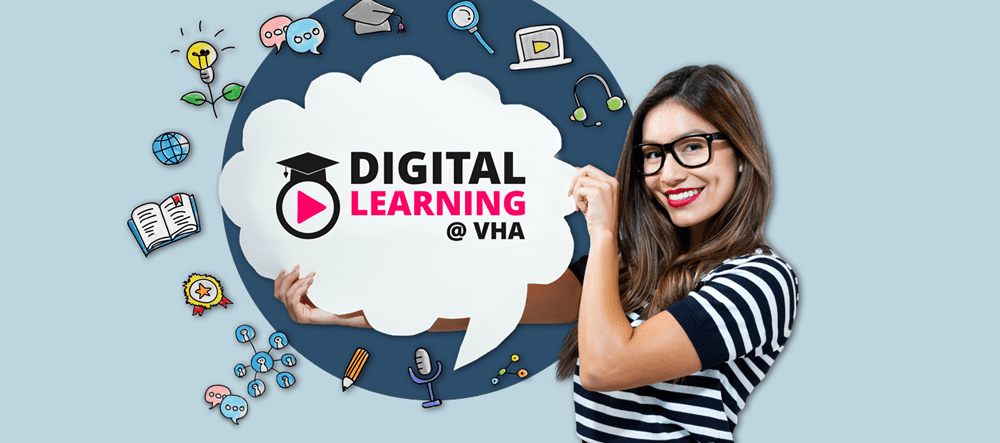Digital Learning at VHA: Classroom Clicks

It is often said that knowledge is power. But in today’s information age, knowledge—and sharing that knowledge—is not simply power, it can enhance performance and transform organizational culture. Knowledge sharing is what separates great organizations from good ones and what can help ordinary workers become extraordinary.
Transferring knowledge has often presented logistical challenges in home health care, as service providers work independently scattered across communities. In recent years, VHA has been creating tools to connect our disparate staff and share information more efficiently and effectively. Our new digital learning strategy is the latest VHA initiative to use technology to support our staff to learn and optimize their performance.
Officially launched in November 2018, the strategy was in the works for the previous year. “We started with a needs assessment,” says Sasa Djumic, the VHA Clinical Educator who is leading this initiative. “Our consultant went to different home care companies and looked at things from a clinical perspective, such as improving competency for nurses. Then we examined what we had in house to build a sustainability strategy for education here at VHA.”
Digital learning at VHA encompasses online e-modules, videos and integrating electronic lessons in the classroom setting. “We want to make learning accessible to everyone,” says Sasa. “But our strategy is more than just making new educational content available. It’s also about making the most of the infrastructure we have. Our learning management system, for example, has valuable administrative capabilities that help support our decision making. The system tells us statistics of who is using the materials, whether they are completing programs, how long it takes them, etc. It provides us detail that you wouldn’t necessarily get from in-person sessions. Our digital learning tools help us better track our success and give us the flexibility to pivot when necessary,” he adds.
Flexibility is a key benefit on the learning side as well. The digital learning tools are available to users 24/7, allowing staff and service providers to pursue learning at their own convenience and pace until they are confident they understand the material. “Our staff love it because they don’t have to call someone to book a class, etc., and if they need to go over something a few times, they can without judgment” says Sasa.

For VHA, it also offers the benefit of consistent messaging. “We aren’t dependent on the varied styles and abilities of trainers or facilitators. These tools mean everyone receives the same information,” notes Sasa. “There is also a great cost savings in the long run,” he adds, citing the resource considerations of in-person training, such as securing trainers to prepare and deliver multiple sessions, reserving space, refreshments, and taking staff away from their clients for the training. All are eliminated once an online program is developed. “It’s a win-win for everyone if we do it well,” says Sasa.
VHA’s digital learning library now contains an array of tools for VHA’s PSWs, rehab providers and nurses, including many clinical competency validation videos. These nursing videos demonstrate the equipment needed and the specific steps nurses must take to successfully execute procedures and pass VHA’s competency evaluation. As a former field nurse, Sasa has been deeply involved in the development of these videos, applying his first-hand knowledge of the information nurses need and how they want it to make the videos most effective.
Continuing to build the library of competency videos is a priority for 2019, as is transforming VHA’s staff orientation through digital learning. “We can direct new hires to digital learning modules that they can complete before coming to VHA for the in-person portion of the orientation session,” Sasa says. “We also look forward to digitizing our orientation feedback procedures.”
With the digital learning strategy, VHA continues to find new ways to engage our staff and empower them to take charge of their personal growth and career development.
Digital Learning @ VHA is an instructional practice that uses technology to strengthen the learning experience. This includes everything from online e-modules, to videos to the integration of electronic lessons in a classroom setting. It is truly a useful training tool for professional development with many benefits.
